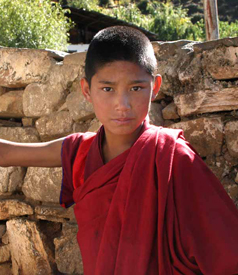Is this minuscule nation, among the least populated in the world (roughly 700,000 inhabitants), stuck between two of the most densely populated countries in the world (India and China), totally isolated for millennia, whose penultimate monarch was the first, at the end of the nineteen seventies, to define and implement the concept of Gross National Happiness (GNH), happier than other countries?
This strange country (a constitutional monarchy, the previous under-fifty-years-old king of which voluntarily retired not long ago to leave the throne to his 27-year-old son) is superficially very backward: a matriarchal system in which polygamy and polyandry are legal, very few cars, no brands in its stores, a single television station and television only since 1999, mobile telephony since 2003, and archery as the national sport.
Moreover, Bhutan society is wholly mobilized for the preservation of its values: a single religion, Mahayana Buddhism, is present at every instant of daily life, with over 10,000 monks paid by the government, but excluded from all political decisions (with their head named by the king and officially his equal); very rigorous regulations covering architecture and urbanization that perfectly preserve the craft industry of religious art; almost everyone wearing the national costume almost all the time and speaking a language close to ancient Tibetan, among 19 other local languages.
And yet, this country succeeds (thanks, especially, to considerable hydroelectric wealth which Indian companies primarily both produce and consume) in enjoying a standard of living that is high for the region. Parliamentary democracy is vigilant there. Health and education are free for life, including very selective higher education.
On top of all that, the country measures its well-being by the GNH indices which have nothing to do with their reduction under the UN Human Development Index rubric: instead of an illusory single index, Bhutans know that happiness is multi-dimensional. They distinguish nine dimensions of happiness: psychological well-being, health, education, the use of time, cultural diversity, governance, the vitality of democratic life, environmental diversity and standard of living. For example, 60 percent of the country must remain forested and the fight against corruption there is very rigorous. Moreover, the development of these indices makes the headlines of the country’s several newspapers which are often highly critical of the government.
However, things are far from perfect there: first of all, several of these indices are measured by polling, with the biases that that implies. Then, much more seriously, the country, which was 90 percent rural not long ago, is urbanizing at great speed, which has led to inflation, unemployment and inequalities.
We must watch this country’s development closely. If it succeeds, clear-sightedly, in preserving its identity without renouncing material growth, then we should be inspired by its way of thinking, mode of political debate and development. If it fails, then, not only will we have lost one of the most beautiful civilizations of human history, but, even more, that would be (like the asphyxiation of the bird in the coal mine) a very bad sign. Once again, all of this depends on us.
Translation: Truthout French Language Editor Leslie Thatcher.
Join us in defending the truth before it’s too late
The future of independent journalism is uncertain, and the consequences of losing it are too grave to ignore. To ensure Truthout remains safe, strong, and free, we need to raise $22,000 by the end of today. Every dollar raised goes directly toward the costs of producing news you can trust.
Please give what you can — because by supporting us with a tax-deductible donation, you’re not just preserving a source of news, you’re helping to safeguard what’s left of our democracy.
